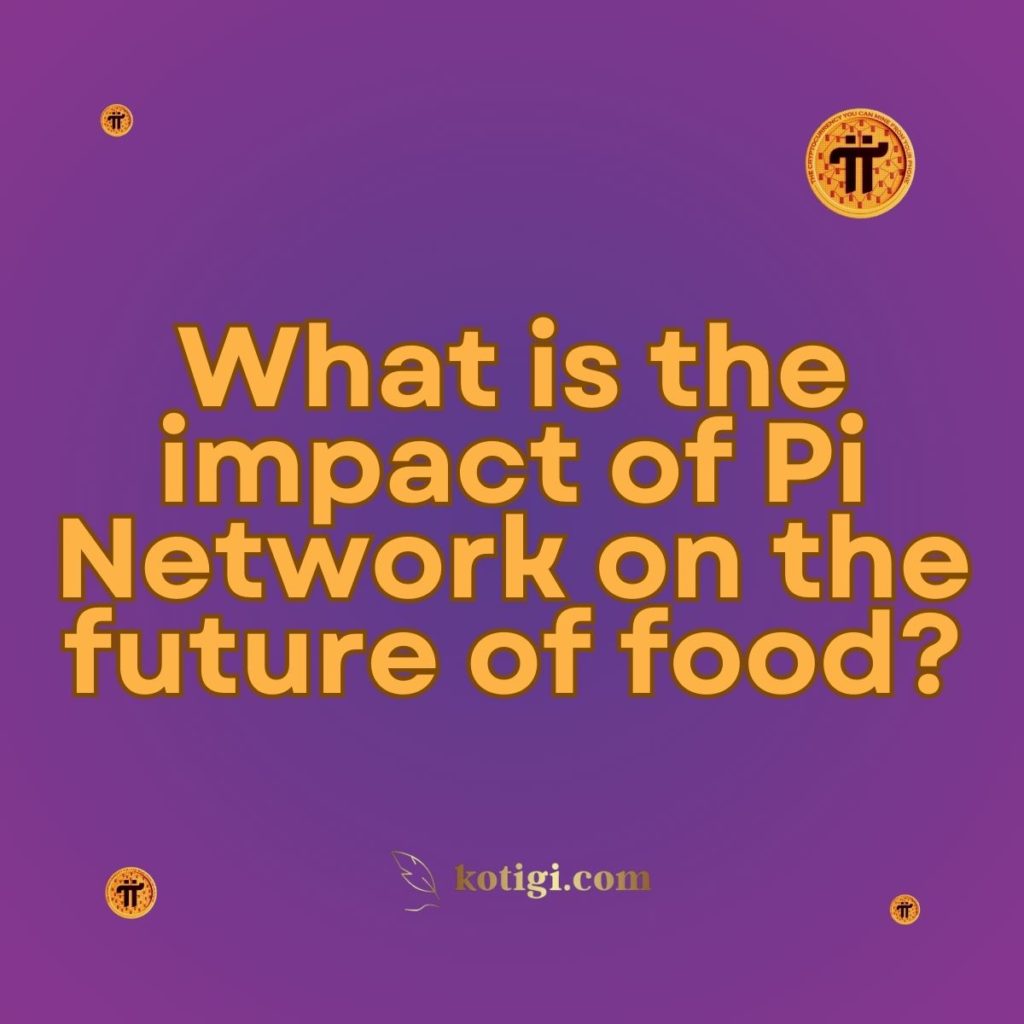
What is the impact of Pi Network on the future of food?
Pi Network’s decentralized blockchain technology has the potential to revolutionize the future of the food industry by enhancing supply chain transparency, promoting peer-to-peer transactions, supporting local farmers, and reducing food waste. In this article, we explore how Pi Network could shape the future of food production, distribution, and consumption.
Introduction
The food industry is a complex global network involving producers, suppliers, retailers, and consumers. As the demand for transparency, sustainability, and efficiency grows, emerging technologies like blockchain are gaining prominence in addressing key challenges in the food supply chain. Pi Network, a mobile-first cryptocurrency, holds significant potential to reshape the food industry by promoting decentralized transactions, improving traceability, supporting local agriculture, and fostering innovative solutions to reduce food waste. This article delves into the potential impact Pi Network could have on the future of food and how it can help build a more sustainable, transparent, and efficient food ecosystem.
Enhancing Food Supply Chain Transparency
Blockchain technology is increasingly being utilized to bring transparency to food supply chains, and Pi Network can play a pivotal role in this transformation.
Blockchain for Food Traceability
Food safety and transparency are major concerns for consumers today. Pi Network’s blockchain can provide immutable records of every step in the food supply chain, from farm to table. This allows consumers to verify the origin, quality, and safety of the food they purchase, helping to build trust and reduce instances of fraud and contamination.
Preventing Food Fraud
Food fraud, such as mislabeling or tampering with products, is a widespread issue. With Pi Network’s decentralized blockchain, each transaction or movement of food products is securely recorded, making it impossible to alter or falsify information. This ensures that consumers receive accurate information about the products they are buying, reducing fraud in the marketplace.
Strengthening Accountability in the Supply Chain
Pi Network’s transparent ledger allows for greater accountability among all players in the food supply chain. Whether it’s farmers, distributors, or retailers, each party can be held accountable for their role in the production and distribution process. This level of transparency can encourage more ethical and sustainable practices throughout the food industry.
Promoting Peer-to-Peer Food Transactions
Pi Network’s decentralized model supports direct peer-to-peer (P2P) transactions, making it easier for consumers to buy food directly from local farmers and producers.
Supporting Local Farmers
With Pi Network, consumers can engage in direct transactions with local farmers, eliminating the need for intermediaries such as wholesalers or retailers. This provides farmers with a larger share of profits and enables consumers to access fresher, locally sourced produce. Using Pi coins as a form of payment, farmers can receive instant and secure payments without relying on traditional financial systems.
Reducing Transaction Costs
Traditional payment systems often involve high fees for small-scale producers, which can cut into their profit margins. Pi Network’s decentralized nature significantly reduces transaction fees, allowing for more affordable transactions between farmers and consumers. This makes it easier for small producers to thrive in a competitive market while offering consumers lower prices for fresh food.
Expanding Access to Local Food Markets
Pi Network can empower local farmers by giving them access to a broader market. Through decentralized platforms powered by Pi coins, farmers can reach customers outside their immediate geographical area, expanding their customer base and increasing their income potential. At the same time, consumers gain access to fresh, locally produced food that may not be available in traditional supermarkets.
Supporting Sustainable and Ethical Food Production
Sustainability and ethical sourcing are growing concerns in the food industry. Pi Network can play a crucial role in promoting more responsible food production and consumption practices.
Incentivizing Sustainable Farming
Pi Network can be used to create decentralized platforms that reward sustainable farming practices. Farmers who adopt eco-friendly methods, such as organic farming or regenerative agriculture, can receive Pi coins as incentives. This encourages more farmers to shift toward sustainable practices, ultimately reducing the environmental impact of food production.
Promoting Fair Trade
With Pi Network, fair trade can be further reinforced. Blockchain technology ensures that all parties involved in the supply chain are paid fairly and transparently, with no room for exploitation. This can benefit small-scale farmers and workers in developing countries, ensuring that they receive fair compensation for their efforts while promoting ethical sourcing of food products.
Empowering Ethical Consumers
Pi Network’s transparent supply chain can help ethical consumers make more informed choices about the food they purchase. By providing verifiable information about the origin, production methods, and labor practices involved in food production, Pi Network enables consumers to support brands and products that align with their values.
Reducing Food Waste with Decentralized Solutions
Food waste is a significant issue worldwide, and Pi Network has the potential to help reduce it through decentralized, blockchain-based solutions.
Tracking Expiry Dates and Food Quality
Pi Network’s blockchain can be used to track food products’ journey from production to retail, including their expiration dates and handling conditions. This real-time data can help retailers better manage stock, reducing the amount of unsold food that goes to waste. Consumers can also use this data to make informed decisions about the freshness and quality of their food purchases.
Facilitating Surplus Food Redistribution
Decentralized platforms powered by Pi Network can enable the redistribution of surplus food from retailers, restaurants, or farms to those in need. Through these platforms, businesses and individuals can donate or sell surplus food at reduced prices to prevent it from going to waste. Payments can be made securely using Pi coins, creating a seamless process for both donors and recipients.
Enabling Circular Food Economy Models
Pi Network can support the development of circular food economy models, where food waste is minimized and repurposed. For instance, food waste from restaurants could be turned into animal feed or compost through decentralized trading networks. Pi coins could be used to facilitate these exchanges, incentivizing businesses and individuals to contribute to a circular economy that reduces overall food waste.
Fostering Innovation in the Food Industry
Pi Network’s blockchain infrastructure provides opportunities for innovation in food production, distribution, and consumption.
Blockchain-Driven Food Startups
The food industry is ripe for disruption, and Pi Network’s decentralized platform can support the growth of blockchain-driven food startups. Entrepreneurs can create new business models that leverage Pi Network’s transparency and decentralized payments to address issues such as food security, traceability, and sustainability. These startups can use Pi coins for funding, transactions, and reward systems within their ecosystems.
Smart Contracts for Food Delivery
Smart contracts on Pi Network’s blockchain can streamline food delivery processes, ensuring that orders are processed securely and efficiently. Whether it’s a farm-to-table transaction or a food delivery service, smart contracts can automate payments, delivery schedules, and even dispute resolution. This can increase trust and reliability in food delivery services.
Driving Technological Advancements in Food Production
Pi Network’s decentralized infrastructure can also support advancements in food technology. Innovations such as vertical farming, precision agriculture, and lab-grown food could benefit from Pi Network’s transparent and secure platform. With Pi coins as a form of payment, investors, producers, and consumers can participate in building a tech-driven food future.
Conclusion
Pi Network’s potential impact on the future of food is vast, ranging from enhancing supply chain transparency to promoting sustainable practices and reducing food waste. By enabling decentralized transactions, supporting local farmers, and fostering innovation, Pi Network is set to drive significant changes in how food is produced, distributed, and consumed. As blockchain technology continues to evolve, Pi Network could play a central role in building a more ethical, sustainable, and efficient global food system.
Key Takeaways
- Supply Chain Transparency: Pi Network enhances transparency in the food supply chain, helping to prevent fraud and ensuring food safety.
- Peer-to-Peer Transactions: Pi Network supports direct transactions between consumers and local farmers, reducing costs and empowering small-scale producers.
- Sustainable Food Production: The platform promotes sustainable farming and fair trade practices, encouraging ethical sourcing of food products.
- Reducing Food Waste: Pi Network can help track food quality and expiration dates while facilitating the redistribution of surplus food to minimize waste.
- Innovation in Food: Pi Network fosters innovation in the food industry, enabling blockchain-driven startups, smart contracts for food delivery, and technological advancements in food production.





